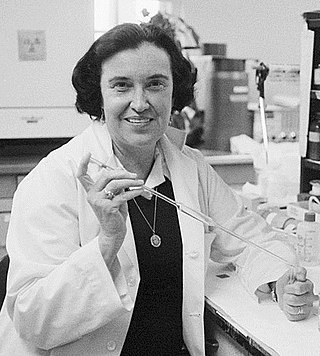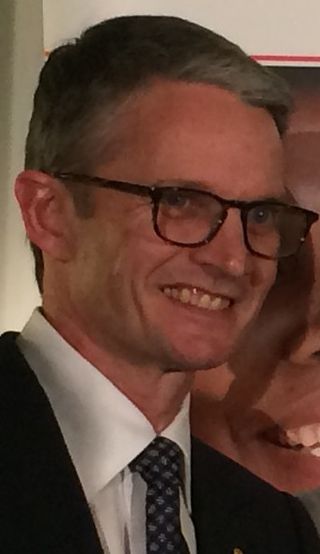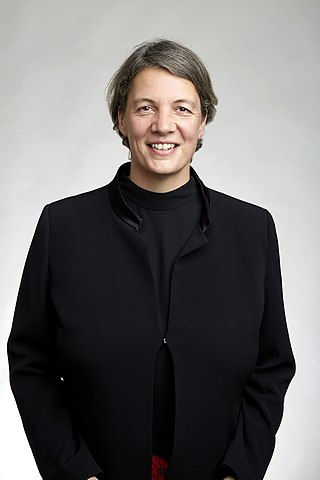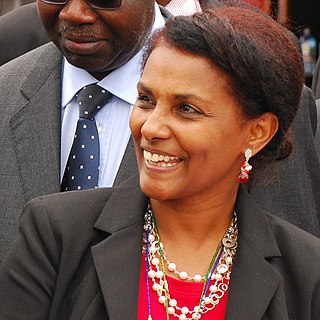Related Research Articles

Fiona Juliet Stanley is an Australian epidemiologist noted for her public health work, her research into child and maternal health as well as birth disorders such as cerebral palsy. Stanley is the patron of the Telethon Kids Institute and a distinguished professorial fellow in the School of Paediatrics and Child Health at the University of Western Australia. From 1990 to December 2011 she was the founding director of Telethon Kids.

Rosalyn Sussman Yalow was an American medical physicist, and a co-winner of the 1977 Nobel Prize in Physiology or Medicine for development of the radioimmunoassay technique. She was the second woman, and the first American-born woman, to be awarded the Nobel Prize in Physiology or Medicine.

Elizabeth Helen Blackburn, is an Australian-American Nobel laureate who is the former president of the Salk Institute for Biological Studies. Previously she was a biological researcher at the University of California, San Francisco, who studied the telomere, a structure at the end of chromosomes that protects the chromosome. In 1984, Blackburn co-discovered telomerase, the enzyme that replenishes the telomere, with Carol W. Greider. For this work, she was awarded the 2009 Nobel Prize in Physiology or Medicine, sharing it with Greider and Jack W. Szostak, becoming the first Australian woman Nobel laureate. She also worked in medical ethics, and was controversially dismissed from the Bush administration's President's Council on Bioethics.

Peter Charles Doherty is an Australian immunologist and Nobel laureate. He received the Albert Lasker Award for Basic Medical Research in 1995, the Nobel Prize in Physiology or Medicine jointly with Rolf M. Zinkernagel in 1996 and was named Australian of the Year in 1997. In the Australia Day Honours of 1997, he was named a Companion of the Order of Australia for his work with Zinkernagel. He is also a National Trust Australian Living Treasure. In 2009 as part of the Q150 celebrations, Doherty's immune system research was announced as one of the Q150 Icons of Queensland for its role as an iconic "innovation and invention".

The Florey Institute of Neuroscience and Mental Health, more commonly known as the Florey Institute, is an Australian medical research institute that undertakes clinical and applied research into treatments for brain and mind disorders and the cardiovascular system. The institute's areas of interest include Parkinson's disease, stroke, motor neurone disease, traumatic brain and spinal cord injury, addiction, epilepsy, multiple sclerosis, brain development in premature babies, Autism, Huntington's disease, depression, schizophrenia, brain function in health and disease, heart failure, and dementia.
Adrienne Elizabeth Clarke is Professor Emeritus of Botany at the University of Melbourne, where she ran the Plant Cell Biology Research Centre from 1982–1999. She is a former chairman of the Commonwealth Scientific and Industrial Research Organisation, former Lieutenant Governor of Victoria (1997–2000) and former Chancellor of La Trobe University (2011–2017).
Derek Ashworth Denton was an Australian scientist who explained the regulation of electrolytes in extracellular fluid, the hormones controlling this regulation, particularly aldosterone, and the instinctive behaviours controlling intake of water and salts. He was cited in 1995 at election to the U.S. National Academy of Sciences as the world’s leading authority on the regulation of salt and water metabolism and relevant endocrine control mechanisms. He was one of Australia’s most eminent scientists.
Michael Cowley FTSE is an Australian physiologist. He is best known for his mapping of the neural circuits involved in metabolism and obesity and diabetes treatment. He is a professor in the Department of Physiology at Monash University in the Faculty of Biomedical and Psychological Sciences. He is also a director of the Australian diabetes drug development company, Verva Inc, and director of the Monash Obesity & Diabetes Institute] (modi).

Brendan Scott CrabbFASM is an Australian microbiologist, research scientist and director and chief executive officer of the Burnet Institute, based in Melbourne, Victoria, Australia.

Michelle Yvonne Simmons, is a Scientia Professor of Quantum Physics in the Faculty of Science at the University of New South Wales and has twice been an Australian Research Council Federation Fellow and is an Australian Research Council Laureate Fellow. She is the Director of the Australian Research Council Centre of Excellence for Quantum Computation & Communication Technology and is recognised internationally as the creator of the field of atomic electronics. She was the inaugural editor-in-chief of npj Quantum Information, an academic journal publishing articles in the emerging field of quantum information science. On 25 January 2018, Simmons was named as the 2018 Australian of the Year for her work and dedication to quantum information science. On 10 June 2019, Simmons was appointed an Officer of the Order of Australia (AO) in the 2019 Queen's Birthday Honours in recognition of her "distinguished service to science education as a leader in quantum and atomic electronics and as a role model."
Marilyn Bernice Renfree is an Australian zoologist. She completed her PhD at the Australian National University, was a post-doctoral fellow in Tennessee and then Edinburgh before returning to Australia. Since 1991, Renfree has been Professor of Zoology at the University of Melbourne. Her main research interest focuses on reproductive and developmental biology of marsupials.
Ann Janet Woolcock AO FAA FRACP was an Australian respiratory physician–scientist and one of the world's leading asthma experts. She contributed greatly to the field of asthma research and founded the Institute of Respiratory Medicine, Sydney, which is now known as the Woolcock Institute of Medical Research.
Aleksandra Filipovska is a Senior Research Fellow at the University of Western Australia, heading a research group at the Harry Perkins Institute of Medical Research. Specializing in biochemistry and molecular biology, she has made contributions to the understanding of human mitochondrial genetics in health and disease.

Linda Richards is an Australian researcher at Queensland Brain Institute (QBI) at the University of Queensland.

Segenet Kelemu is an Ethiopian scientist, noted for her research as a molecular plant pathologist, and outstanding scientific leadership. For close to three decades, Kelemu and her team's research has contributed to addressing agricultural constraints in Africa, Asia, Latin America and North America.

Stephen James Simpson is the executive director of Obesity Australia and the academic director of the Charles Perkins Centre.

Melissa Helen Little is an Australian scientist and academic, currently Theme Director of Cell Biology, heading up the Kidney Regeneration laboratory at the Murdoch Children's Research Institute. She is also a Professor in the Faculty of Medicine, Dentistry and Health Sciences, University of Melbourne, and Program Leader of Stem Cells Australia. In January 2022, she became CEO of the Novo Nordisk Foundation Center for Stem Cell Medicine reNEW, an international stem cell research center based at University of Copenhagen, and a collaboration between the University of Copenhagen, Denmark, Murdoch Children’s Research Institute, Australia, and Leiden University Medical Center, The Netherlands.
Maternal fetal stress transfer describes the physiological phenomenon by which psychosocial stress experienced by a mother during her pregnancy can be transferred to the fetus. Psychosocial stress describes the brain's physiological response to perceived social threat. Because of a link in blood supply between a mother and fetus, it has been found that stress can leave lasting effects on a developing fetus, even before a child is born. According to recent studies, these effects are mainly the result of two particular stress biomarkers circulating in the maternal blood supply: cortisol and catecholamines.
David Joshua Handelsman, (AO) is trained in Medicine and Endocrinology. His expertise is in testicular function and androgen physiology, pharmacology, and toxicology. His experience spans basic, clinical, and public health domains including a recent focus on genetic models of androgen action, steroid mass spectrometry, and anti-doping science. He was Australia’s first Professor in Reproductive Endocrinology and Andrology. He has worked in the USA, Australia, and Germany. His professional involvement includes the World Health Organisation (WHO) Human Reproduction Programme's Male Task Force, WHO Human Reproduction Programme, United Nations Fund for Population Activities, Endocrine Society of Australia, World Anti-Doping Agency’s Health, Medicine and Research Committee, and Australian Drug Evaluation Committee.
Kerrie Ann Wilson is an Australian environmental scientist and the Pro Vice-Chancellor at Queensland University of Technology (QUT). Wilson is also an affiliated professor in conservation science at the University of Copenhagen, honorary professor at The University of Queensland, a member of the Australian Heritage Council and the Australian Natural Sciences Commissioner for UNESCO.
References
- 1 2 3 4 5 6 "The Endocrine Society of Australia - Life Members". www.endocrinesociety.org.au.
- ↑ "StackPath" (PDF).[ permanent dead link ]
- 1 2 3 4 5 "Archived copy" (PDF). Archived from the original (PDF) on 14 August 2014. Retrieved 15 August 2014.
{{cite web}}: CS1 maint: archived copy as title (link) - ↑ "Australian Academy of Science - SATS 2004". Archived from the original on 14 August 2014. Retrieved 14 August 2014.
- ↑ "Home - DHHS Service Providers". Dhs.vic.gov.au. Retrieved 9 June 2020.
- ↑ http://www.nged.adelaide.edu.au/member_profiles/Wintour_Marelyn.html?template=print Archived 2014-08-14 at the Wayback Machine
- ↑ "Healthy Start for a Healthy Life: The Wintour’s Tale". Archived from the original on 14 August 2014. Retrieved 14 August 2014.